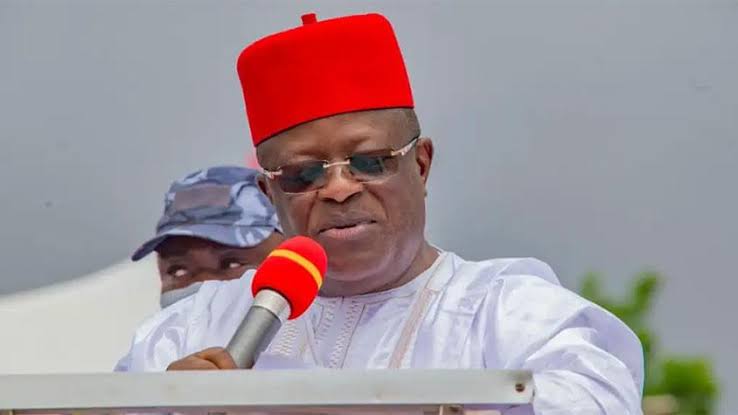Headline
Umahi bows to pressure, breaks down Cost of Lagos-Calabar coastal highway

Nigeria’s Minister of Works, Dave Umahi, has defended the high cost of the ongoing Lagos-Calabar Coastal Highway, emphasizing that the expenditure is justified and even lower than comparable international projects.
In a recent interview with newsmen, Umahi provided a detailed breakdown of the figures, revealing that the first section of the 700km highway spanning 47.47 kilometers will cost ₦1.067 trillion. The ambitious project is set to include six lanes, flyovers, underpasses, and extensive shore protection measures, reflecting its scale and strategic importance.
“A standard coastal road is going for N7.5billion per kilometer of standard highway,” Umahi said.
READ ALSO: Drama on Live TV as Umahi, Arise TV’s Rufai Oseni clash over Lagos–Calabar coastal highway project
“However, this N7.5 billion includes all the fillings, shore protections, solar lighting throughout, and planting of trees.”
According to the minister, the ₦7.5 billion per kilometer figure is derived from dividing the total cost of ₦1.067 trillion for the 47.47-kilometer stretch by the number of lanes and converting it to the standard two-lane measurement used for federal highways.
“The first section, 47.47 kilometers, is costing ₦1.067 trillion and is six lanes. When you divide this ₦1.067 trillion by 47.47 and by two, you will get 11.57 — a kilometer of three lanes,” Umahi explained.
“A standard federal highway is two lanes. So by the time you now divide by three and multiply by two, you will see that a standard coastal road is going for ₦7.5 billion per kilometer.”
Umahi said the figure covers not only the construction cost but also shoreline defenses, solar-powered street lighting, concrete retaining walls, and landscaping.
He claimed that the ministry had faced challenging terrain along the route, encountering deep pits up to 20 meters which had to be excavated and refilled in stages before concrete laying could commence.
“You encounter a pit of up to 20 meters and then this pit we removed and then refilled with lumps in levels and stages and then we are passing through there now. At kilometer 32, we also have encountered such,” he said.
The minister further compared the coastal highway project to earlier asphalt-based road projects awarded by previous administrations.
He argued that the current use of reinforced concrete makes the new road longer-lasting and more cost-effective.
“As at five years ago, the cost of one meter cubed of concrete awarded by the past administration was ₦729,000 per meter cubed,” Umahi said.
“We started the coastal highway with ₦350,000 per meter cubed. So leave out the president or any other person, hold me accountable, ask me questions, come for debate, and I will give you the cost of one meter cubed of concrete.”
Umahi added that the project had been reviewed and approved by Dutch and other international financial institutions, which, according to him, described it as “undervalued.”
“The Dutch bank that led the other international banks to review the cost of the project said it was undervalued. And when it was time to fund the 70% loan component, the project was oversubscribed by 100 million US dollars,” he stated.
The Works Minister, a former governor of Ebonyi State, challenged critics of the project to “be objective” and “tell the public the truth,” stressing that both he and President Bola Tinubu were committed to transparency.
“If the financial institutions can give us this credit, we are ready to face anybody. But when you are criticising us, be very objective and tell the public the truth,” Umahi said.
(SaharaReporters)





















